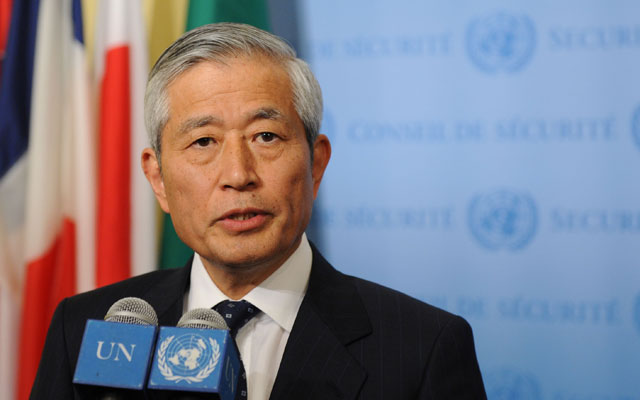The morning’s discussion at the U.N. on the Arms Trade Treaty (ATT) brought into focus one of the underlying tensions among the nations negotiating the treaty.
While the holier-than-thou contingent wants to use it as a way to restrain oppressive governments, the autocracies view it as a way to prevent individuals from acquiring weapons.
Even if little new is actually being said—the ATT process is now almost a decade old—this battle is being fought out at the conference on many fronts. The current draft treaty text refers, in most places, to the “end use” of the arms under discussion, language that the U.S. prefers in order to avoid any infringement on Second Amendment rights. But a smattering of autocracies and others want to refer to “end users” because, as Syria noted, the treaty would then target “unauthorized” non-state actors, such as the ones that are currently trying to overthrow the Syrian regime.
By the same token, Article 12 in the preamble allows nations to exercise “their right to adopt additional and more rigorous measures consistent with the purpose of this Treaty.” In other words, the ATT would not deprive the U.S. of its right to run its current gold-standard export control system. The autocracies also dislike this clause, because, as they recognize, a tighter export system is likely to make it very hard for them to buy weapons from the democracies.
At bottom, what the autocracies dislike is the way the treaty has evolved over the past several years. When it was initially proposed, the world’s nations wanted one thing above all: a treaty that would recognize their right to buy and sell arms. But since then, the treaty has been driven forward largely by the holier-than-thous and their NGO choir, which turned it into a treaty that focuses on human rights criteria and the wrongdoings of the world’s governments.
Those wrongdoings are frequently very real. But in the clash between the autocracies and the sanctimonious, the U.S. can find no comfort. The autocracies aren’t aiming at the Second Amendment, but a treaty that focuses on non-state actors raises the specter of bans on the import of firearms by anyone but the government—because what the autocracies really mean by “non-state actors” is “private citizens.”
The sanctimonious aren’t fond of the Second Amendment either, but their response is to push all the harder for a treaty that fully includes ammunition (which the U.S. made clear today that it would not accept) and has human rights standards that are incompatible with the existing U.S. system, which the Administration has pledged to preserve.
Liechtenstein’s intervention this morning caught the flavor of this group nicely with its argument that even if a nation is suffering from a massive external attack on its civilian population, no one should sell arms to the victim if there were a “substantial” risk that the victim would commit any human rights abuses. By this way of thinking, only those as pure as driven snow should be armed; everyone else should just die quietly.
The U.S. is caught in the middle. It has so far intervened twice in the debate, once to warn against expanding the scope and criteria of the treaty to a point where it becomes unenforceable and once to state—rather plaintively—that while it respects the systems of other nations, they should extend the same courtesy to the U.S. and keep a preambular mention of civilian ownership. This was not a popular position. Only the Czech Republic supported the U.S. without reservations.
But it was Japan that, as the afternoon’s discussion opened, made the most shocking statement of the day. It argued that, while it is nice to pretend that arms-exporting nations can mitigate the risk that their weapons will be used irresponsibly, most importing U.N. member states are incapable of taking the necessary measures. Mitigation is part of the U.S. system, so in one way this was a criticism of the U.S. But in the context of the U.N., it is novel (and even offensive) to make the obvious point that many of the governments in the room are, to put it simply, incompetent.































